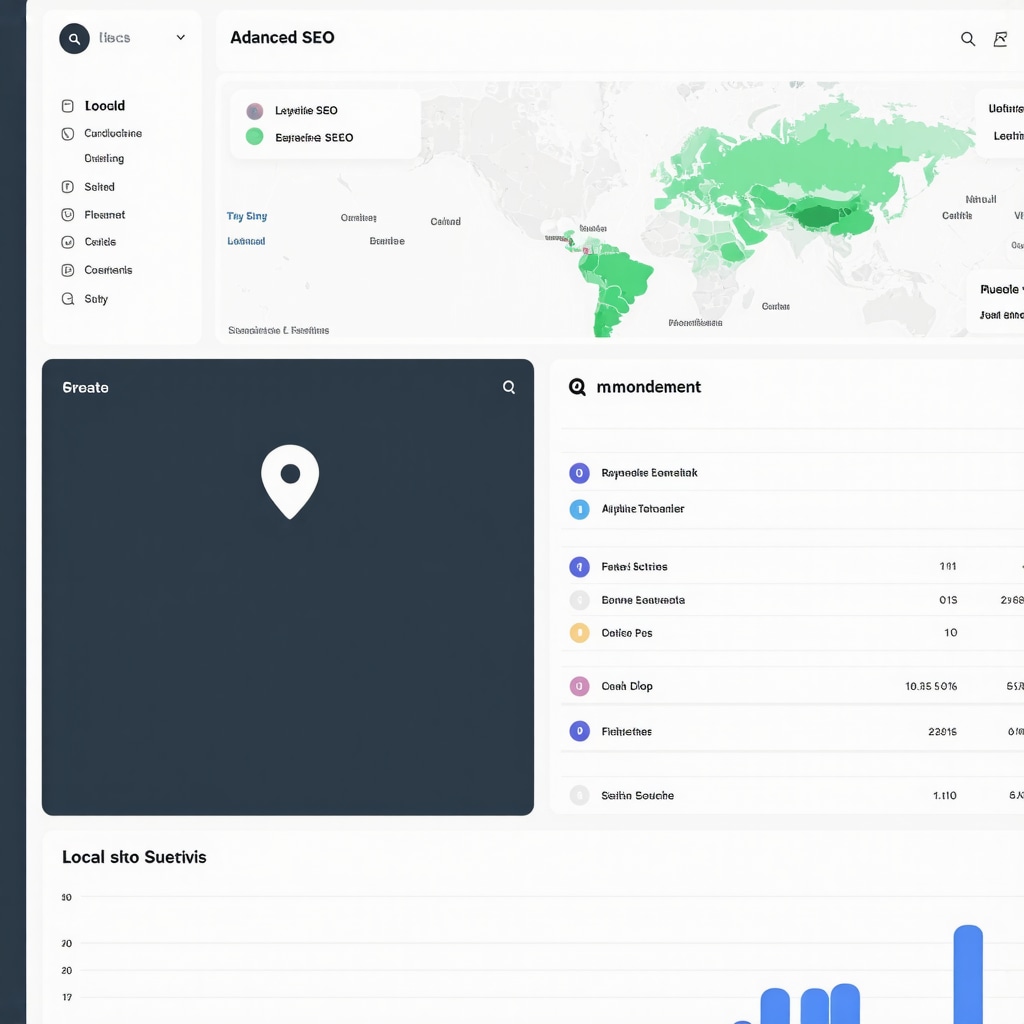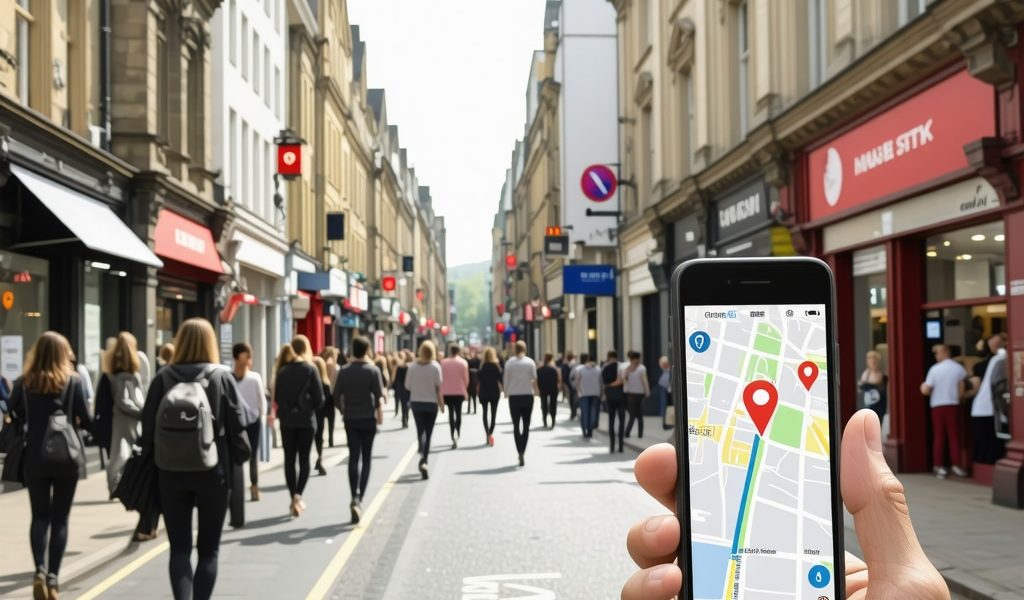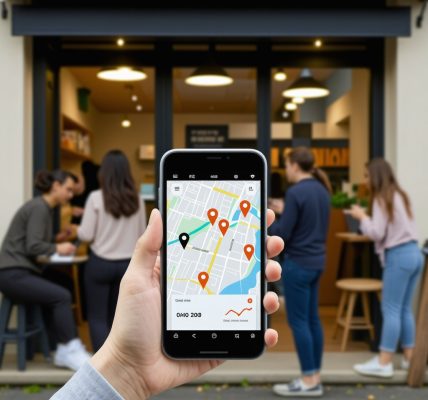Unlocking the Complexities of Google Maps SEO: A Strategic Perspective for 2025
In the fiercely competitive landscape of local search, mastering Google Maps SEO is no longer optional—it’s an essential component of any advanced digital marketing strategy. As algorithms evolve and user behaviors shift, understanding the nuanced mechanics behind Google Maps rankings is crucial for businesses seeking to dominate their local markets. This article explores sophisticated practices rooted in expert insights, leveraging semantic SEO, and integrating cutting-edge tools to ensure your local visibility remains unparalleled in 2025.
The Underlying Algorithmic Foundations of Google Maps Rankings
Google Maps ranking relies heavily on a complex interplay of relevance, proximity, and prominence. Recent studies, including those outlined in Google’s complete guide to Google Business SEO, emphasize the importance of authoritative citation signals and review engagement metrics. Beyond these, emerging factors such as semantic keyword clustering within your business profile and localized content authority significantly influence your position in the local pack.
Harnessing Semantic SEO for Local Authority Building
Semantic SEO enables businesses to embed contextually rich keywords—LSI keywords—that resonate with user intent and search query nuances. For instance, incorporating terms like “urban landscaping in downtown Chicago” or “emergency plumbing services near University District” enhances relevance and signals topical authority. These strategies go beyond simple keyword stuffing, requiring an in-depth understanding of user search patterns and intent, supported by tools like Google’s Keyword Planner and BrightLocal.
Optimizing Google Business Profile for Advanced Local Visibility
Effective optimization involves more than filling out basic business information. Advanced practitioners focus on crafting comprehensive, keyword-rich descriptions that address niche-specific search intents. Additionally, regularly updating photos with high-quality, optimized images and leveraging GMB post features enhances engagement metrics, which are increasingly factored into ranking algorithms.
How Can Businesses Leverage Local Citations and Reviews for Competitive Edge?
Building a robust citation profile across high-authority local directories and industry-specific platforms is fundamental. Expert services like GMB citation management can streamline this process. Equally, review generation tactics—such as automated follow-ups and review gating—serve as powerful signals of credibility, directly impacting prominence and trustworthiness in Google’s eyes.
What Are the Emerging Trends and Open Debates in Google Maps SEO for 2025?
Is voice search optimization becoming indispensable for local rankings?
With the proliferation of voice assistants, optimizing for voice queries—often more conversational and longer—has become critical. This entails integrating natural language keywords and FAQs into your profile and website content. The debate persists on how much voice search impacts local pack rankings directly, but experts agree that it complements existing local SEO efforts by capturing a broader spectrum of user intent.
For those seeking to deepen their expertise, exploring advanced local SEO techniques and staying abreast of algorithm updates is indispensable. Consider consulting with seasoned professionals or contributing insights on emerging tactics to foster community knowledge sharing.
If you’re ready to elevate your local search strategy, explore our comprehensive guide to mastering Google Business SEO and unlock the full potential of Google Maps for your business.
Leveraging AI and Machine Learning for Hyper-Targeted Local SEO
As Google continues to refine its algorithms using AI and machine learning, businesses must adapt by integrating these technologies into their local SEO strategies. AI-driven tools like Google Keyword Planner and BrightLocal’s analytics can uncover deep insights into user intent and behavior, enabling more precise targeting. These insights allow businesses to tailor their content and service offerings, making their Google Business Profile more relevant and attractive to local searchers.
Can Your Business Capitalize on Hyperlocal Content and Personalized Experiences?
Creating hyperlocal content—such as neighborhood-specific blog posts, event updates, and local news—can significantly boost your relevance in the local pack. Personalization, through dynamic content tailored to user location and preferences, enhances engagement and encourages more review activity, which is crucial for local rankings. Implementing these tactics requires a nuanced understanding of your community’s unique needs and active content management, supported by tools like SEMrush and Moz Local for ongoing optimization.
What Are the Ethical and Practical Considerations of Manipulating Local Search Signals?
While optimizing for Google Maps SEO is essential, it is equally important to adhere to ethical practices. Manipulating reviews or citations can result in penalties, undermining long-term visibility. Instead, focus on genuine engagement strategies such as community involvement, transparent review solicitation, and authoritative citation building, as outlined in comprehensive GMB SEO audits. These practices ensure sustainable growth and trustworthiness in your local market.
To explore these advanced techniques further, consider consulting with local SEO experts or leveraging platforms like BrightLocal to monitor your progress and adapt strategies dynamically. For practical implementation, visit our complete guide to mastering Google Business SEO.
Share your thoughts or ask questions in the comments below—what innovative tactics are you experimenting with to stay ahead in local search? If you found this article helpful, don’t forget to share it with your network or explore more expert insights on local SEO for small businesses.
Harnessing Local Data Analytics for Precision Optimization in Google Maps SEO
In the dynamic world of local search, leveraging granular data analytics has become a game-changer for businesses aiming to ascend the Google Maps rankings. Advanced tools like Google’s Places API and third-party analytics platforms enable marketers to dissect user behavior patterns, search trends, and engagement metrics at a hyperlocal level. By decoding this data, you can tailor your SEO strategies with surgical precision, focusing on high-impact keywords and service areas that resonate most with your target audience.
The Power of Schema Markup and Structured Data in Local SEO
Implementing schema markup—especially LocalBusiness schema—is no longer optional for those seeking an edge. Properly structured data enhances your business’s visibility in rich snippets, knowledge panels, and local packs, providing Google with explicit context about your offerings, operating hours, and geographic relevance. According to Moz’s comprehensive guide to schema markup, the correct deployment of structured data can significantly improve click-through rates and local prominence, especially when combined with other authority signals.
How Do Hyperlocal Content Strategies Influence Google Maps Rankings?
Hyperlocal content—such as neighborhood guides, local events, and community success stories—serves as a powerful signal of local relevance. Integrating real-time updates about local happenings and creating content tailored to specific districts or districts’ unique characteristics not only enhances user engagement but also signals topical authority to Google. This approach demands an ongoing content calendar and active community involvement, supported by tools like SEMrush’s local SEO toolkit or Moz Local for tracking and optimizing local content assets.

Illustration of a hyperlocal content strategy map with neighborhood-specific blog posts and event updates.
Can Advanced Reputation Management Techniques Sustain Long-term Local SEO Success?
Beyond acquiring reviews, sophisticated reputation management involves proactive engagement, sentiment analysis, and crisis mitigation. Employing AI-powered review monitoring systems—such as ReviewTrackers or BirdEye—can identify emerging issues before they impact your rankings. Moreover, developing a community ambassador program encourages authentic reviews and fosters trust, which are paramount to maintaining prominence in Google Maps. As Google increasingly emphasizes trustworthiness, these reputation signals must be managed with a strategic, ethical approach aligned with Google’s review policies.
What Are the Implications of Zero-Click Local Searches for Google Maps SEO?
Zero-click searches—where users find answers directly in the search results—pose both challenges and opportunities for local businesses. Optimizing your Google Business Profile with featured snippets, FAQs, and timely updates ensures your business remains visible even when users don’t click through. According to Search Engine Land, leveraging structured data and frequently asked questions can increase your chances of appearing in these coveted zero-click features, thereby maintaining your local visibility and authority without relying solely on click-through metrics.
As the landscape of local SEO continues to evolve with AI integrations and user behavior shifts, staying ahead demands a commitment to innovation, data-driven decision-making, and ethical practices. For a deep dive into these advanced tactics, explore our comprehensive guide to Google Business SEO mastery. Share your insights or questions below—what cutting-edge strategies are you experimenting with to stay at the forefront of Google Maps SEO in 2025?
Unlocking the Future of Local Search: Cutting-Edge Google Maps Optimization Techniques
As the digital landscape becomes increasingly saturated, staying ahead in Google Maps rankings requires innovative approaches grounded in the latest technological advancements and market insights. Leveraging AI-powered local data analytics, sophisticated schema markup, and hyperlocal content strategies can dramatically elevate your visibility and influence in 2025. This article explores these advanced tactics, providing a comprehensive roadmap for seasoned marketers seeking to refine their local SEO mastery.
Deciphering the Role of AI and Machine Learning in Hyper-Targeted Local SEO
Google’s integration of AI and machine learning algorithms has revolutionized how local search results are personalized and ranked. Tools such as Google’s Places API enable granular analysis of user behavior, enabling businesses to craft hyper-targeted content that resonates deeply with local audiences. By analyzing search trends and engagement patterns, marketers can identify untapped service areas and optimize their profiles with surgical precision, ensuring relevance and prominence in competitive markets.
How Can Structured Data and Schema Markup Enhance Local Visibility?
Implementing schema markup, particularly LocalBusiness schema, provides Google with explicit context about your enterprise, facilitating the generation of rich snippets that stand out in search results. According to Moz’s comprehensive guide to schema markup, this structured data significantly improves click-through rates and boosts local pack rankings, especially when integrated with other authority signals like reviews and citations. Advanced schema strategies include dynamic event annotations, service attributes, and geo-specific details that reinforce your relevance at the hyperlocal level.
What are the most effective ways to integrate schema markup for maximum impact?
For optimal results, deploy JSON-LD format schema across your website and Google My Business profile, ensuring consistency and accuracy. Regularly audit your structured data using tools like Google’s Rich Results Test to identify and rectify issues, thereby maintaining optimal visibility and trustworthiness in search results.
Engage with industry-leading sources such as Moz or SEMrush for ongoing updates on schema implementation best practices, and consider consulting with SEO specialists to tailor your markup strategy to your niche’s unique demands.
Hyperlocal Content as a Catalyst for Local Authority Building
Creating hyperlocal content—such as neighborhood-specific blog posts, local event coverage, and community success stories—serves as a powerful signal of your relevance and authority within specific districts. Integrate real-time data and local news to keep content fresh and engaging, fostering increased review activity and social sharing. Tools like SEMrush’s local SEO toolkit and Moz Local facilitate ongoing content optimization and performance tracking, ensuring your hyperlocal efforts translate into tangible rankings improvements.
Can Reputation and Review Management Strategies Sustain Long-Term Dominance?
Beyond acquiring reviews, sophisticated reputation management involves sentiment analysis, crisis mitigation, and community engagement. AI-driven platforms like ReviewTrackers enable proactive monitoring of reviews, allowing businesses to respond swiftly and authentically. Developing community ambassador programs encourages genuine reviews and fosters trust—factors increasingly prioritized by Google’s ranking algorithms. Adhering strictly to Google’s review policies, as detailed in the official Google guidelines, safeguards your profile’s integrity and ensures sustainable growth.
What Ethical Considerations Are Crucial in Advanced Local SEO Tactics?
While aggressive optimization can yield short-term gains, ethical practices—such as transparent review solicitation and authoritative citation building—are fundamental for long-term success. Manipulative tactics, including fake reviews or citation spam, risk penalties and damage brand credibility. Focus on community involvement, providing value-driven content, and fostering authentic engagement to build a resilient local presence that aligns with Google’s evolving trust and authority signals.
Embrace Data-Driven Decisions: The Key to Consistent Growth
Utilize advanced analytics platforms like Google Analytics and BrightLocal to monitor local search performance meticulously. These insights enable ongoing refinement of your strategies, ensuring your business remains adaptable amid algorithm updates and shifting consumer behaviors. Regular audits and competitor analysis help identify new opportunities and threats, allowing for proactive adjustments that sustain your competitive edge.
Ready to elevate your Google Maps SEO game? Dive into our comprehensive guide to Google Business SEO mastery and harness the full potential of emerging technologies and strategies. Share your insights or questions below—what innovative tactics are propelling your local SEO success in 2025?
Expert Insights & Advanced Considerations
1. Prioritize Semantic Contextualization
Leveraging semantic SEO not only enhances relevance but also aligns your content with evolving search intents, making your local listings more authoritative and discoverable in 2025.
2. Embrace Hyperlocal Content Innovation
Creating dynamic, neighborhood-specific content fosters deeper community engagement and signals topical authority, crucial for high rankings in competitive local markets.
3. Optimize with Structured Data & Schema Markup
Implementing comprehensive schema, especially LocalBusiness schema, boosts your visibility through rich snippets and knowledge panels, directly impacting click-through rates and local prominence.
4. Integrate AI-Driven Analytics for Precision
Utilizing AI tools like Google’s Places API and BrightLocal’s platform enables hyper-targeted strategies based on granular user data, ensuring your SEO efforts are both effective and adaptable.
5. Maintain Ethical Optimization Practices
Focus on genuine review management and authoritative citation building to sustain long-term trustworthiness, avoiding penalties and enhancing your reputation in Google’s ecosystem.
Curated Expert Resources
- Google’s Official Documentation: Provides authoritative guidelines on Places API, schema markup, and review policies essential for compliant optimization.
- Moz’s Schema Markup Guide: Offers comprehensive strategies for deploying structured data effectively to enhance local visibility.
- BrightLocal Platform: An industry leader in local SEO analytics, crucial for data-driven decision-making and reputation management.
- SEMrush Local SEO Toolkit: Facilitates hyperlocal content planning, keyword optimization, and competitive analysis for sustained growth.
- Google’s Rich Results Test: An essential tool for auditing structured data implementation and maximizing rich snippet appearances.
Final Expert Perspective
As the landscape of Google Maps SEO continues to evolve rapidly into 2025, the integration of semantic relevance, hyperlocal content, and sophisticated structured data remains paramount. The most successful practitioners will combine these technical strategies with ethical practices and advanced analytics to build resilient, authoritative local profiles. For those committed to mastery, exploring our comprehensive guide to Google Business SEO is an essential step. Engage actively with these insights, contribute your expertise, and stay ahead of the curve—your local dominance depends on it.



